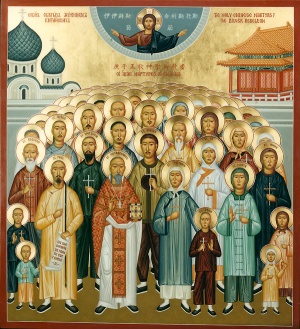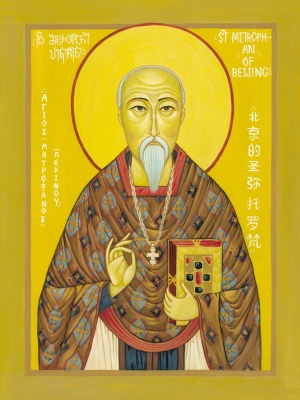Martirii Chinei: Diferență între versiuni
(→Legături externe) |
(→Viețile) |
||
| Linia 2: | Linia 2: | ||
[[image:ChineseMartyrs.jpg|right|thumb|O icoană a celor peste șaptezeci de mucenici uciși împreună cu preotul Mitrophan.]] '''Sfinții Mucenici ai Chinei''' au fost [[martir]]izați la Rebeliunea Boxerilor (Mișcarea Yihetuan) din 1900. [[Praznic]]ul lor are loc pe [[11 iunie]]. | [[image:ChineseMartyrs.jpg|right|thumb|O icoană a celor peste șaptezeci de mucenici uciși împreună cu preotul Mitrophan.]] '''Sfinții Mucenici ai Chinei''' au fost [[martir]]izați la Rebeliunea Boxerilor (Mișcarea Yihetuan) din 1900. [[Praznic]]ul lor are loc pe [[11 iunie]]. | ||
==Viețile== | ==Viețile== | ||
| − | [[image:Mitrophan.jpg|left|thumb| | + | [[image:Mitrophan.jpg|left|thumb|Sf. Mitrofan, părinte duhovnicesc și unul dintre mucenicii Chinezi ai Rebeliunii Boxerilor.]] |
| − | ===Preotul | + | ===Preotul Mitrofan=== |
| − | + | Preotul [[Mitrofan Ji|Mitrofan]], a cărui nume chinez a fost Ji chong sau Tsi Chung, s-a născut pe [[10 decembrie]] 1855. Și-a pierdut tatăl în copilăria timpurie și a fost crescut sub îngrijirea bunicii sale Ecaterina și a mamei sale Marina; mama sa a fost o învățătoare la o școală pentru femei. În acest timp, el a trecut prin multe probleme. Când Arhimandritul [[Paladie (Kafarov) de Beijing|Paladie]] a devenit cap al misunii pentru a doua oară, l-a însărcinat pe profesorul său, să-și ia marea grijă de a-l educa pe Mitrofan, în scopul de a-l pregăti pentru eventuala sa [[hirotonie]]. Înainte de a ajunge la vârsta de douăzeci de ani, el a fost numit în postul de catihet. La 25 de ani a fost [[hirotonie|hirotonit]] în preoție de Nicolae, [[episcop]]ul Japoniei. | |
| − | + | Mitrofan a fost o persoană [[smerenie|smerită]], foarte prudent și liniștit, pașnic și despătimit; chiar când se confrunta cu mari insulte, nu încerca să se justifice pe sine. Din momentul sosirii sale în Beijing (北京, Peking), Arhimandritul Paladie i-a comandat lui Mitrofan, după cu a făcut profesrul său Long Yuan, să încerce să obțină preoția. Mitrofan, însă, n-a vrut să accepte hirotonia și a refuzat-o mereu, spunând „cum poate o persoană fără abilități suficiente și milă îndrăzneață să accepte acest mare rang?” Dar sub îndemnurile puternice ale Arhimandritului [[Flavian (Gorodetski) de Kiev și Galici|Flavian]], succesorul lui Paladie, și persuasiunea profesorului, Mitrofan a asculat,and the persuasion of the teacher, Mitrophan obeyed, cu toate că știa că odată cu acceptarea preoției, sfârșitul să este inevitabil. Sub ascultarea Arhimandritului Flavian, Mitrofan a ajutat la traducerea și verficarea cărților. Timp de cincisprezece ani, l-a slujit neobosit pe Dumnezeu în timp ce suferea multe răni și insulte, și de la propriii săi oameni, și de la străini. În celed din urmă a avut o cădere moderată. Mai târziu, după asta, și-a petrecut trei ani lcuind înafara misiunii, primind jumătate din fostul să salariu. Întreaga sa viață Părintele Mitrofan n-a fost niciodată lacom, iar acest fapt l-a avantajat mult. | |
====Martiriul==== | ====Martiriul==== | ||
Versiunea de la data 26 iulie 2014 15:58
| Acest articol (sau părți din el) este propus spre traducere din limba engleză!
Dacă doriți să vă asumați acestă traducere (parțial sau integral), anunțați acest lucru pe pagina de discuții a articolului. |
Cuprins
Viețile
Preotul Mitrofan
Preotul Mitrofan, a cărui nume chinez a fost Ji chong sau Tsi Chung, s-a născut pe 10 decembrie 1855. Și-a pierdut tatăl în copilăria timpurie și a fost crescut sub îngrijirea bunicii sale Ecaterina și a mamei sale Marina; mama sa a fost o învățătoare la o școală pentru femei. În acest timp, el a trecut prin multe probleme. Când Arhimandritul Paladie a devenit cap al misunii pentru a doua oară, l-a însărcinat pe profesorul său, să-și ia marea grijă de a-l educa pe Mitrofan, în scopul de a-l pregăti pentru eventuala sa hirotonie. Înainte de a ajunge la vârsta de douăzeci de ani, el a fost numit în postul de catihet. La 25 de ani a fost hirotonit în preoție de Nicolae, episcopul Japoniei.
Mitrofan a fost o persoană smerită, foarte prudent și liniștit, pașnic și despătimit; chiar când se confrunta cu mari insulte, nu încerca să se justifice pe sine. Din momentul sosirii sale în Beijing (北京, Peking), Arhimandritul Paladie i-a comandat lui Mitrofan, după cu a făcut profesrul său Long Yuan, să încerce să obțină preoția. Mitrofan, însă, n-a vrut să accepte hirotonia și a refuzat-o mereu, spunând „cum poate o persoană fără abilități suficiente și milă îndrăzneață să accepte acest mare rang?” Dar sub îndemnurile puternice ale Arhimandritului Flavian, succesorul lui Paladie, și persuasiunea profesorului, Mitrofan a asculat,and the persuasion of the teacher, Mitrophan obeyed, cu toate că știa că odată cu acceptarea preoției, sfârșitul să este inevitabil. Sub ascultarea Arhimandritului Flavian, Mitrofan a ajutat la traducerea și verficarea cărților. Timp de cincisprezece ani, l-a slujit neobosit pe Dumnezeu în timp ce suferea multe răni și insulte, și de la propriii săi oameni, și de la străini. În celed din urmă a avut o cădere moderată. Mai târziu, după asta, și-a petrecut trei ani lcuind înafara misiunii, primind jumătate din fostul să salariu. Întreaga sa viață Părintele Mitrofan n-a fost niciodată lacom, iar acest fapt l-a avantajat mult.
Martiriul
On the evening of June 1, 1900 (which was the 17th day of the 5th month on the Chinese calendar)1 , the Boxers (Yihetuan Movement) burned the buildings of the mission. About seventy Christians, hiding from danger, assembled in St Mitrophan's home. Although Fr. Mitrophan's former ill-wishers were among them, he did not drive them out. Seeing that some people were dispirited, he strengthened them, saying that the time of troubles had come and would be difficult to avoid. He himself several times daily went to look at the burned church. On the 10th of June, towards 10 in the evening, soldiers and Boxers surrounded Fr. Mitrophan's dwelling. Up to seventy Christians were there at the time; the stronger among them fled, while Fr. Mitrophan and many others, primarily women and children, remained and were tortured. Fr. Mitrophan sat in his courtyard when the Boxers punctured his chest, and he fell under a date tree. His neighbors removed his body to the mission's almshouse. Later the hieromonk Avraamy picked up Fr. Mitrophan's body and, in 1903, during the first commemoration of the martyrs, it and those of the others, were placed under the altar in the martyrs' church.
Fr. Mitrophan’s family members were also tortured; they included his wife Tatiana and his three sons: the eldest, named Isaiah; the second, called Sergiy, a priest; and the third, Ioann.
Tatiana
On June 11, Tatiana was saved from the Boxers with help from her son Isaiah's bride, but on the following morning, June 12, she was seized along with 19 others and sent to Xiaoyingfang, where the Boxer camp was located, and was finally executed by beheading. An almshouse for the poor now stands on the place of her execution.
Isaia
Isaiah had served in the military for 23 years. On June 7, the Boxers beheaded him because he was known to be a Christian.
Ioan
Ioann (John) was only eight years old at the time. On June 10, when his father was killed, Boxers slashed his shoulders and chopped off his nose, ears, and toes. His brother Isaiah's bride managed to save him from death by hiding him in a latrine. In the morning he sat at the entrance without clothes and shoes, and when people asked "Are you hurting?" he answered “It doesn't hurt." Boys scoffed at him, calling him a “child of demons." Shortly thereafter, he reposed.
Apolytikion
- Apolytikion. Tone one
- Minister to Christ, true priest of glory, reasonable sacrifice and blameless victim, thou gavest thyself up to the stadium with thy flock, O father, Chi - Sung in Beijing. Therefore pray for us who keep thy precious memory with faith»
- Apolytikion. Tone two
- Thou hast become a participator in the customs of the Apostles and a successor to their throne thou hast found the way of ascending to behold God, by thy faithful struggle unto blood with thy flock in Beijing, O God inspired, hieromartyr Chi - Sung Pray to Christ our God, that our souls might be saved.
Megalynarion
- Megalynarion
- A. Rejoice, O priest of Beijing, martyred illustriously with thy flock thou didst destroy the impious schemes of tyrants with the strength of the Lord O Father Chi - Sung.
- B. Mitrophan as a pious God speaking minister thou didst weaken the delusions of the impious by thy feats, with thy flock, O Father, protector from darkness and boast of martyrs.
Vezi și
Legături externe
- Stars of the East, The Chinese Martyrs of the Boxer Rebellion
- The Chinese Martyrs of the Boxer Rebellion, by Fr. Geoffrey Korz. AGAIN magazine. Volume 22, No. 3 (July-September 2000).
Categorii > Istoria Bisericii
Categorii > Liturgică > Sărbători > Sfinți
Categorii > Liturgică > Sărbători > Sfinți > Mucenici
Categorii > Liturgică > Sărbători > Sfinți > Sfinți moderni
Categorii > Locuri > Ortodoxia pe țări > Ortodoxia în China
Categorii > Oameni
Categorii > Oameni
Categorii > Oameni

